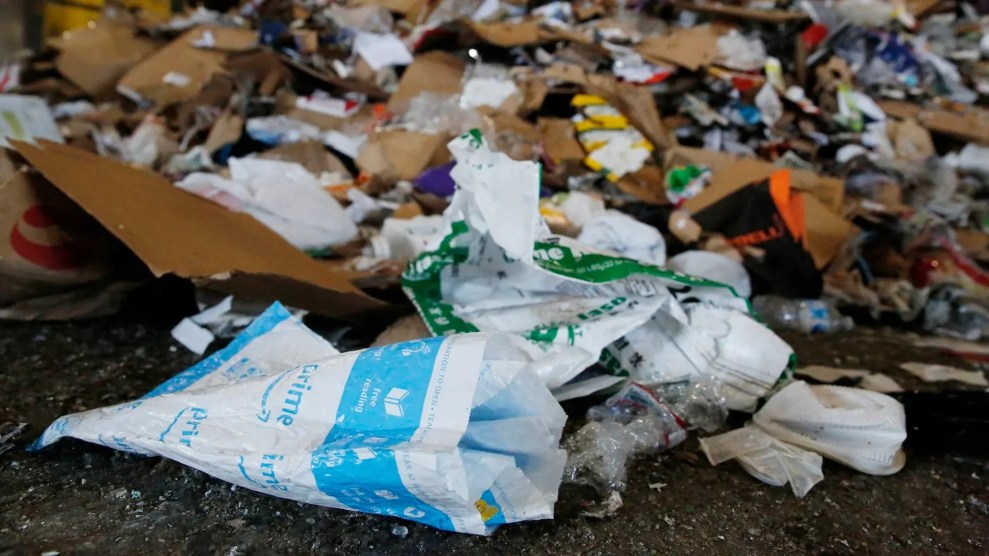Senate Democrats, aided by a handful of rebel moderate Republicans, have derailed the giveaway-laden Bush-Cheney energy initiative — at least until lawmakers return to Washington after Christmas. But the fight is far from over.
GOP leaders are already gearing up to push the bill through as soon as they reconvene. What’s more, various Republican leaders are vowing that every controversial giveaway in the bill — including huge tax breaks for nuclear power plants and energy producers, a blanket legal protection for makers of the dangerous gas additive MTBE, and a huge subsidy for makers of ethanol –- will survive in some form.
Such brazen pandering has even rankled conservative pundits, notably Robert Novak, who derided the measure as little more than “a vehicle for special interests.”
“A classic case, described in detail by the Public Citizen liberal watchdog group, involves $800 million in federal loan guarantees for Minnesota-based Excelsior Energy to build a coal gasification plant. Although this would be the largest American facility of this type, neither the Senate nor the House voted on the risky venture. Excelsior was created by executives tied to NRG Energy, which filed for bankruptcy this year after being fined for manipulating energy markets.
Excelsior’s executives since January 2002 have contributed more than $15,000 to congressional candidates, with more than $7,000 going to Republican Sen. Norm Coleman of Minnesota (elected in 2002). Thirteen lobbyists employed by Excelsior have contributed $44,000 in the same cycle. Minnesota’s Democratic Sen. Mark Dayton joined Coleman in voting for the bill.”
Irwin M. Stelzer of The Weekly Standard takes a similarly critical view of the measure — although Stelzer seems primarily interested in chastising the Democrats who broke ranks to support the bill. Partisan priorities aside, however, Stelzer at least sees the measure for what it is:
“The tax incentives contained in the bill will cost $25.7 billion over 10 years, according to the Congressional Budget Office, plus another $5.4 billion in direct spending–a total price tag several multiples of what Bush had in mind. But since the president has dismissed the already burgeoning federal deficit as “just numbers,” money is no object to a White House eager to notch victories on its legislative revolver in advance of the election that is now less than a year away.
…
There are incentives to build a trans-Alaska natural gas pipeline; subsidies to cover the insurance costs associated with the production of nuclear power; tax breaks to encourage a bit more domestic production of natural gas and oil; handouts to the automobile companies to spare them the need to devote more of their own money to research into energy-efficient vehicles; $100 million per year in production tax credits for new nuclear plants; $6.2 million to promote the use of bicycles; $1 billion for a nuclear reactor in Idaho to produce hydrogen, and so much more that one is put in mind of the Stephen Sondheim lyric: ‘Something for everyone, a comedy tonight.'”
]
Comedy or tragedy, GOP ringleaders like Sen. Pete Domenici promise the show will go on. The man behind the nuclear industry handouts (as Mother Jones Washington correspondent Michael Scherer reported here while the bill was still in its infancy), Domenici has done his best to suggest that opponents of his pet measure are inviting fuel shortages and more blackouts like the one which hit northeastern states this summer.
“The blackouts in America will remain alive and possible because we will have thrown out the window the reliability standards that are in this bill because some want to make the case on an issue like MTBE or the like,” said Domenici. “If you like blackouts, then you vote to kill this bill.”
But Domenici might want to look a little closer to home before playing the blackout card again. After all, a federal inquiry in to the blackouts has fingered FirstEnergy Corp., an Akron-based utility as the primary culprit — a company which has been a generous campaign contributor to Republican candidates, including Domenici. And, while investigators claim that lax oversight, slipshod maintenance, and poor overall practices at FirstEnergy led to the blackout, the company is likely to skate without facing any federal penalties — thanks to the legacy of deregulation.
As Bush administration officials are quick to point out, FirstEnergy didn’t actually violate any federal regulations — just unenforceable, voluntary industry standards. Skeptics remind us that those voluntary rules — along with FirstEnergy itself and the regional power authority also criticized in the federal report — were all created thanks to the deregulatory policies pursued so eagerly by the Bush White House. As Matt Wald reports in The New York Times, the authors of the report, among them officials at the Energy Department and the Federal Energy Regulatory Commission, “did not address the question of how the industry assumed its current structure.”
“‘Maybe the report doesn’t go there because the answer is not one that’s comfortable politically,’ said Alan H. Richardson, the president of the American Public Power Association, a trade association for electric companies owned by states and cities. Mr. Richardson said examining the role of deregulation in the Midwest grid could have taken the Energy Department and the Federal Energy Regulatory Commission ‘to an area where they didn’t want to go.'”
Wenonah Hauter of Public Citizen, writing on TomPaine.com, suggests that federal officials are unwilling to look deeply into the role of deregulation for the same reason they are likely to let FirstEnergy off with just a wrist-slap: Both are tied directly to the Bush White House.
“FirstEnergy started the problem, why shouldn’t the company be held responsible? Because the Bush administration wants to absolve corporate America from responsibility.
And thanks to its cozy relationship with President Bush, FirstEnergy may get a free pass. The company is a big donor to the White House. In June, the company’s CEO hosted a fundraiser that brought in $600,000 for the Bush-Cheney re-election campaign. Another FirstEnergy executive, president Anthony J. Alexander, gained distinction in 2000 by raising $100,000 for the Bush-Cheney campaign and personally donating another $100,000. When Bush took office, Alexander was included on the Energy Department’s transition team. In the electricity utility industry, FirstEnergy’s PAC and its top executives are the sixth-largest contributors to political campaigns, giving more than $1 million to federal candidates in 2001-2002, with 70 percent of the money going to Republicans. FirstEnergy wields enormous lobbying influence in Congress as well. In 2001-2002, the company spent nearly $3.8 million lobbying Congress and the Bush administration.
…
FirstEnergy may have spurred the power outage, but deregulation deserves the overall blame. Long before the August blackout, the Bush administration pursued a policy of energy deregulation, and now that policy has come back to haunt us.”
Hauter isn’t the only one suggesting there is a “special” relationship between FirstEnergy and the Bush administration — a relationship which encouraged the utility to force on profits instead of reliability, and which is now shielding the firm from real penalties. Shedding more light on that the monetary muscle FirstEnergy has at its disposal, whitehouseforsale.org notes: “H. Peter Burg, the company’s CEO and chairman of the board, hosted a June event that raised more than half a million dollars for Bush-Cheney ’04.”
This wouldn’t be the first time FirstEnergy has been protected by powerful Republicans in Washington. Recently, inspectors discovered a containment leak in the Davis-Besse nuclear reactor, also owned by FirstEnergy, which had gone unnoticed for more than five years. Federal regulators hurriedly shut down the plant, worried that the leak could cause a nuclear disaster of unprecedented proportions. Still, when Republicans in the House investigated they matter, seizing both federal and FirstEnergy documents in the process, they declared the company had done nothing wrong.
Democratic presidential candidate and Ohio Congressman Dennis Kucinich even asked the Nuclear Regulatory Commission to revoke FirstEnergy’s operating license for the plant, at least until the investigation is complete. But the NRC decided to allow the plant to continue running — because of pressure from the Bush administration, Catherine Dong argues on Counterpunch.
“[NRC] Director Collins actually halted a government-ordered shutdown of the plant, after First Energy Corporation pleaded financial hardships, despite harsh criticism of his action from within his own Office of Inspector General. Coincidence? Or do the powers-that-be in Washington feel they want someone in charge who will give proper consideration to the needs of big donors to the Bush campaign, like First Energy?”












